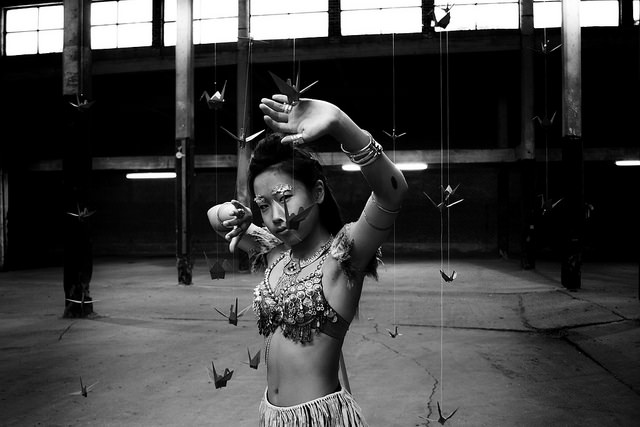I am still afraid of so many things.
Recently, I sat frozen in the middle of my living room, barely breathing because the thing I knew I needed to do caused me to quiver inside.
My head told me I couldn’t do it. My bones became heavy with the thought of it, and for a moment a dark cloud seemed to cover the sun.
What I was about to attempt wasn’t easy, but it was necessary for me to move forward.
Fear and I were having a staring contest, and I was petrified she would win.
In our society we often learn that if something isn’t immediately pleasurable, we shouldn’t do it. But I have found that often it is the hard things that bring about the most growth—not the pleasant ones.
What is it about fear that causes such an aversion in our souls that we want to drop our well-intentioned tasks and run?
The Buddha taught that we should do the opposite. He revealed that fear was an integral part of growth and that only by triumphing through it would we develop the courage to achieve our highest goals.
We must not forget that as we do the gritty work of transcending fear, we cause an equally enlightening impact in the wider world.
Buddhist philosophy teaches that everything is karmically entwined.
Each of our actions alters the greater reality.
As we witness others facing and overcoming adversities, it touches us deeply and reminds us that we have this ability in ourselves, too.
Leading through example, we raise up the world. We begin right here, with whatever is present in our lives—even the shaky stuff. Meeting those things that are quivering inside of us, we both heal others and build something solid within our own souls.
Fear has a special job it came here to do.
Fear shows up so that we can know our courage.
In our spiritual practice we draw on lineage for strength. This means we understand that many have walked a similar path before us and found certain wisdom to enable them to continue. We can tap into this wisdom anytime we need.
When we face something frightening, we recall the courage of all those who have overcome fear before us holding us.
A larger web supports each individual. In Buddhism we call this our sangha, or community.
Courage is not just ours; it is a collective energy. In this sense, frightening things serve to unite us with one another.
The word “courage” comes from the Latin root cor, which means heart. In Old French, corage means innermost feelings. So, when we are afraid, the surest place to drop into for support is our heart. As we do this, we notice fear directing us back to the path of heart-centered living.
The heart, by its nature, connects.
Understanding the things we are afraid of as tools for increasing courage, heart and connection, we can welcome fear, rather then run from it.
We learn in Buddhism that aversion to uncomfortable things is natural, but when we can see fear as a gift, we suddenly find great value in it.
The Buddha taught us to welcome everything. We can do this more easily when we stop burdening experiences with the judgement of “bad” or “good.”
What if we didn’t view being afraid as negative?
Underneath our initial reaction to fear, our heart whispers, “Lean in. Understand you are safe right here.”
Everything in life can be a tool for transformation.
Fear reminds us that our heart is our greatest ally, for right at this centre is the invincible force of love.
The Tao Te Ching (a classical Chinese Taoist text) teaches that courage is the product of love. They say that only the force of love is strong enough to create bravery.
So if we find ourselves afraid right now, instead of being scared of fear itself, let’s welcome it. It is a sign that we are actively choosing to build bravery in our lives.
Being afraid is simply an experience we have called upon to create courage. Step forward and feel the fear.
Know it is here to help us—for fear teaches us how to come back to our beautiful, incredibly wise hearts.
~
Author: Sarah Norrad
Image: Zak Cannon/Flickr
Editor: Toby Israel
~







Read 3 comments and reply